|
|
|
Sort Order |
|
|
|
Items / Page
|
|
|
|
|
|
|
| Srl | Item |
| 1 |
ID:
192246
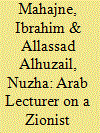

|
|
|
|
|
| Summary/Abstract |
Minority groups tend to experience the academic campus as unpleasant and excluding. Relevant literature attempts to analyze the position of these groups, using terms such as ‘race’ and investigating how higher education institution mechanisms replicate the inequality between the minority group and the hegemonic majority population. In Israel, unresolved problems cause continuing tension between two national groups: citizens who are members of the Palestinian Arab minority (PAMI) and citizens from the Jewish majority. This article focuses on relations between PAMI and Jews on Israeli campuses by drawing upon insights from American research, but it replaces the term ‘race’ with ‘nationality.’ Academe is the only place in Israel where the Arab lecturer is in a position of power vis-à-vis the Jewish student. The study presents this encounter from the viewpoint of the lecturer, drawing on data from interviews with 56 PAMI lecturers in public and private Israeli universities and colleges. The findings indicate that Jewish students use various strategies to divest Arab lecturers of their elevated status in academe.
|
|
|
|
|
|
|
|
|
|
|
|
|
|
|
|
| 2 |
ID:
123929
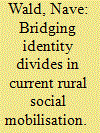

|
|
|
|
|
| Publication |
2013.
|
| Summary/Abstract |
The shift from a corporatist citizenship regime to a neoliberal one has adversely affected Latin American rural communities and led to widespread social mobilisation and organisation in the countryside. The struggle of such marginalised communities has been often framed by stressing their indigenous collective identity over the previously prevalent class-based peasant identity. This article focuses on the role of identity and the negotiation of different identities in the struggle of two rural organisations in Northwest Argentina for securing land tenure and improving their standards of living. Argentinean society, in contrast to some other Latin American societies, is often imagined as 'white,' but in recent decades many peasant, or campesino, communities have rediscovered or reaffirmed their indigenous origin. This article therefore deconstructs rural collective identities in Argentina and analyses how class and ethnic identities are negotiated in struggles of grassroots social organisations in the countryside of this predominantly urban country.
|
|
|
|
|
|
|
|
|
|
|
|
|
|
|
|
| 3 |
ID:
107446
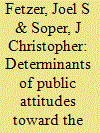

|
|
|
|
|
| Publication |
2011.
|
| Summary/Abstract |
This article investigates the current attitudes of the Taiwanese public toward
the rights of aborigines (Yuanzhumin), a neglected topic both in Taiwan and
throughout the world. The theoretical literature on ethnic politics suggests that
such attitudes might be rooted in one's level of education, ethnic group conflict
and partisanship, intergroup contact, and/or religion-like ideology (Confucian
values). Using data from the 2006 Taiwan Social Image Survey I and our 2009
privately commissioned poll on support for the rights of Taiwanese aborigines,
we test these four theories and find that higher education increases support
for aboriginal rights. The results confirm the ethno-partisanship model for
2006 but not for 2009. Conversely, the percentage of Yuanzhumin living in
a region boosted hostility toward them in 2009 but not in 2006. We likewise
discover that two Confucian values (family loyalty and social hierarchies)
have no statistically significant effect on attitudes toward Yuanzhumin. A
third key Confucian value, social harmony, appears to increase support for
aboriginal rights. Surprisingly, Confucian values seem to pose no hindrance
to the advancement of ethnic minorities' rights and may, in fact, even promote
them.
|
|
|
|
|
|
|
|
|
|
|
|
|
|
|
|
| 4 |
ID:
106077
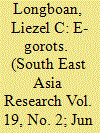

|
|
|
| 5 |
ID:
099616
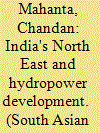

|
|
|
|
|
| Publication |
2010.
|
| Summary/Abstract |
Hydropower, while being projected as a clean and renewable energy source, has time and again been resisted vociferously in North East India in recent times because of the obvious and unintended social and environmental impacts. The anticipated negative impacts of the associated dam and reservoir construction have cast a threat to the security of the indigenous people in terms of water, food, livelihood, energy and above all, the related socio-economic concerns. This is all the more due to the uncertainties flowing from an inadequate understanding of the possible geo-environmental impacts in a highly sensitive terrain. To cope and live with the potential negative ramifications of hydropower projects, a comprehensive hydropower policy with emphasis on long-term environmental and social security and sustainability is imperative.
|
|
|
|
|
|
|
|
|
|
|
|
|
|
|
|
| 6 |
ID:
132278
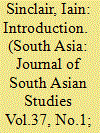

|
|
|
|
|
| Publication |
2014.
|
| Summary/Abstract |
Michael Allen is a pioneering figure in the study of the Newars, the indigenous people of Nepal's Kathmandu Valley. Allen carried out his main fieldwork in Nepal between the mid 1960s and late 1970s and enjoyed a successful academic career, twice acting as head of the Department of Anthropology at the University of Sydney between 1985 and 1991. While Allen is also well known for his studies of cults in settings as disparate as Vanuatu and Ireland-and after retirement was honoured by colleagues for his 'commitment to the comparative method' with a festschrift published in 2001 -his work on the Newars remains especially vital and worth re-visiting. The population, environment and government of Nepal have all changed greatly in recent decades; at the same time, the significance of Newar religion is beginning to be more widely appreciated. In this special section of South Asia we re-examine some of the rituals, institutions and traditions treated by Allen in four new papers, contributed by scholars around the world.
|
|
|
|
|
|
|
|
|
|
|
|
|
|
|
|
| 7 |
ID:
175365
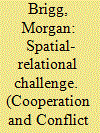

|
|
|
|
|
| Summary/Abstract |
The nascent spatial turn in peace and conflict studies is a promising development that expands conceptual resources and offers useful correctives to existing scholarship. However, the turn to space and place tends not to adequately emplace itself (including on its own European-derived terms) or sufficiently engage the socio-spatial difference of diverse peoples. Instead, a de-contextualised knower is invited to apply a new set of mobile scholarly tools in various settings without seriously considering diverse peoples’ conceptualisation and operationalisation of place in socio-political ordering. Long-standing Aboriginal Australian approaches to place, meanwhile, indicate the diversity and sophistication of approaches to space and place. They furthermore show that western political ontology – including the figures of the individual and the state embedded in much dominant scholarship – may not be relevant in many settings in which peace and conflict scholarship is undertaken. Realising the full potential of the spatial turn requires grappling with the relational emplacement of the knowing subject and the varied ways in which place configures socio-political order both for diverse peoples ‘in the field’ and in the centres of dominant forms of knowing in the Global North.
|
|
|
|
|
|
|
|
|
|
|
|
|
|
|
|
| 8 |
ID:
113899
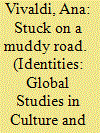

|
|
|
|
|
| Publication |
2011.
|
| Summary/Abstract |
This article explores how the Toba, an indigenous group in the North of Argentina, shape places and an urban subjectivity in the frictions of their mobility between villages, the urban barrio (neighborhood), and the periurban bush. I argue that the experience of Toba moving to the city is better understood as frictions between the Toba desire to progress in the city, the organization of difference in space, and their multiple movements "back" to the villages. In addition, I analyze their contemporary hunting trips, which take urban Toba to the nearby bush, as a mobility that shapes a form of indigeneity engaged with access to both the city center and the bush. This practice confronts them with ranch owners and police but reconnects the barrio and the bush by traversing them. If frictions emerge between forces that trigger movement and forces that slow that movement down, in the frictions of mobility the Toba have at once shaped their position in the city and overflowed its limits.
|
|
|
|
|
|
|
|
|
|
|
|
|
|
|
|
| 9 |
ID:
163314
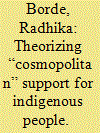

|
|
|
|
|
| Summary/Abstract |
This article presents a nuanced analysis of the role of the international support for a social movement in India, which became known as the Niyamgiri Movement. It uses the theory of normative cosmopolitanism to conduct the analysis. The Niyamgiri Movement was aimed at preventing the mining of a mountain which an indigenous community believed was sacred. The article advances theoretical insights into normative cosmopolitanism, and it also contributes to previous research on the Niyamgiri Movement in India that has not examined the role of its international supporters in sufficient detail. In the article, postcolonial scholar Gayatri Spivak’s theories are used to qualify the analysis of the international support for the Niyamgiri Movement in terms of normative cosmopolitanism. The concept of soft power is also discussed as an alternative theoretical lens, which could also be used to interpret the role of the governmental actors that supported the Niyamgiri Movement.
|
|
|
|
|
|
|
|
|
|
|
|
|
|
|
|
| 10 |
ID:
148256
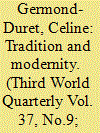

|
|
|
|
|
| Summary/Abstract |
The debates over Indigenous peoples and development are often framed within the discussion on the shift towards modernity, the imposition of economic liberalism and resistance against external interventions, with a tendency to see Indigenous peoples as a possible alternative to the world economic order. However, looking at many development agencies’ discourses, the idea that Indigenous peoples will actually benefit from modernity prevails. The literature is divided along these two conflicting views and dominated by binary oppositions: traditional/modern; backward/advanced; sustainable/unsustainable, etc. This article discusses the tradition/modernity dichotomy and raises the following questions: is it relevant to think in terms of modernity/tradition in the case of Indigenous peoples? What does the use of such a dichotomy imply? What is the alternative? The article demonstrates that this binary opposition is neither relevant nor desirable, and that a new analytical framework is required. Instead, it proposes using a normalisation framework, which focuses on the attempts made to ‘normalise’ Indigenous peoples and to encourage them to comply with existing social and economic models.
|
|
|
|
|
|
|
|
|
|
|
|
|
|
|
|
| 11 |
ID:
143572


|
|
|
|
|
| Summary/Abstract |
Indigenous peoples’ right to prior consultation and to informed consent represents the basis of the new global model shaping state–indigenous relations. Consultation processes promise to enable indigenous people to determine their own development and are especially promoted when extraction projects with significant socio-environmental impacts are planned on indigenous lands. In this article we draw on debates on participatory development in order to analyse the first state-led consultations in Bolivia’s and Peru’s hydrocarbon sectors (2007–14). The analysis shows that effective participation has been limited by (1) an absence of indigenous ownership of the processes; (2) indigenous groups’ difficulties defending or even articulating their own visions and demands; and (3) limited or very general outcomes. The study identifies real-life challenges, such as power asymmetries, a ‘communication hurdle’ and appropriate timing – as well as simplistic assumptions underlying the consultation approach – that account for the unfulfilled promises of this new model.
|
|
|
|
|
|
|
|
|
|
|
|
|
|
|
|
| 12 |
ID:
152781
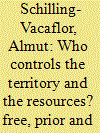

|
|
|
|
|
| Summary/Abstract |
The article scrutinises the struggles over prior consultation and free, prior and informed consent (FPIC) and analyses the divergent interpretations of what this right would entail in Bolivia. Similar contestations have played an important role in resource conflicts across Latin America. Using rich empirical data, the article discusses (1) disputes over legal norms regulating this participatory right, (2) related claims to territorial control and resource sovereignty, and (3) consultation participants’ constrained influence. In doing so, it focuses on the Guaraní’s diverse attempts to shape consultation processes and their outcomes according to their own ends and shows how many of these initiatives have been curtailed.
|
|
|
|
|
|
|
|
|
|
|
|
|
|
|
|
| 13 |
ID:
153678
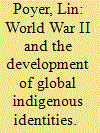

|
|
|
|
|
| Summary/Abstract |
The indigenous rights movement emerged in the last quarter of the twentieth century, establishing a newly conceptualized identity claimed not on the grounds of shared culture, language or ancestry but on shared experience as native peoples marginalized by colonial expansion. This article examines how the Second World War created conditions favouring the emergence of indigenous identity as a global concept. Using a comparative perspective, this paper considers two ways in which war conditions affected indigenous peoples: by highlighting issues of citizenship, loyalty and military service; and by altering how combatant powers evaluated indigenous cultures. While the experiences of particular groups varied widely, the wartime era focused attention on both policies of assimilation and assertions of distinctiveness, creating a fluid context for change. A global, comparative perspective offers insight into the role of the war era in understanding the relationship between indigenous activism and the international order.
|
|
|
|
|
|
|
|
|
|
|
|
|
|
|
|
|
|
|
|
|